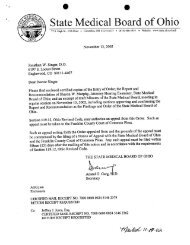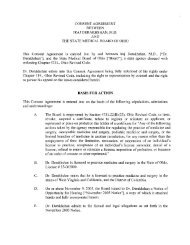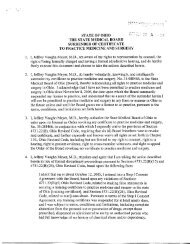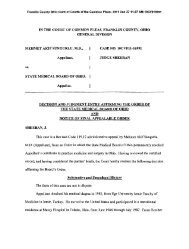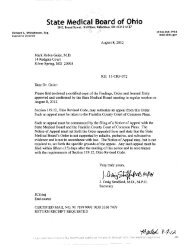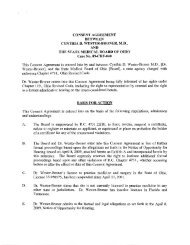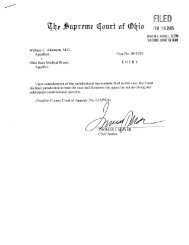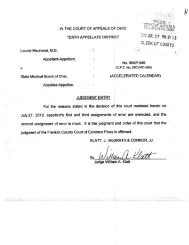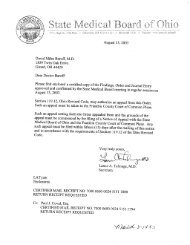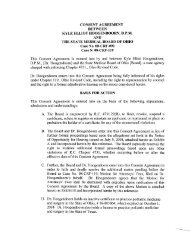Saravana Sivashankcr, MD. 216 Lake Bluff Drive Columbus, OH ...
Saravana Sivashankcr, MD. 216 Lake Bluff Drive Columbus, OH ...
Saravana Sivashankcr, MD. 216 Lake Bluff Drive Columbus, OH ...
Create successful ePaper yourself
Turn your PDF publications into a flip-book with our unique Google optimized e-Paper software.
10906<br />
SARAVANA E. SIVASHANKER, M.D.<br />
July 12, 2000<br />
Dr. Egner directed the Board’s attention to the matter of <strong>Saravana</strong> E. Sivashanker, M.D. She advised that<br />
objections were filed to Hearing Examiner Murphy’s Report and Recommendation and were previously distributed<br />
to Board members.<br />
DR. SOMANI MOVED TO APPROVE AND CONFIRM MS. MURPHY’S PROPOSED FINDINGS<br />
OF FACT, CONCLUSIONS, AND ORDER IN THE MATTER OF SARAVANA E. SIVASHANKER,<br />
M.D. MR. BROWNING SECONDED THE MOTION.<br />
Dr. Egner stated that she would now entertain discussion in the above matter.<br />
Dr. Somani stated that he looked at this case and saw this as a question of quality of care of poor patients by<br />
Dr. Sivashanker. These cases go back ten or more years. Dr. Somani stated that he is a little concerned about the<br />
testimony from the expert on behalf of the Board and the testimony of the cardiologist, the nephrologist and others<br />
who testified on behalf of Dr. Sivashanker. Obviously, when the medical professions review a case that’s about<br />
ten years old, it becomes very difficult to go back to the thinking of the medical professionals at that time in light of<br />
what has been learned over the intervening ten to twelve years. Sometimes the discussion does reflect the current<br />
thinking of how a case would be managed today versus how it would have been managed ten years ago.<br />
Dr. Somani stated that he was somewhat surprised that the testimony of Dr. Beaver and Dr. Miller was in many<br />
respects similar, but there were some points they disagreed on regarding how the care should have been provided.<br />
His reading of the cases and some of the discussion and details suggested to him that there may have been some<br />
degree of discussion about how the case should have been managed, but he didn’t get the impression that there<br />
was gross negligence in all of these cases. He felt that the Proposed Order to suspend the license is inappropriate.<br />
This is an old case of patient care of ten to twelve years ago. He cannot support the proposed suspension.<br />
DR. SOMANI MOVED TO DISMISS THIS CASE. The motion died for lack of a second.<br />
Dr. Egner stated that Dr. Sivashanker testified at hearing that he had given up all of his hospital privileges, but<br />
actually his privileges were revoked at two hospitals. He was unable to maintain a private practice. She believes<br />
that minimal standards cases always go back a fair amount of time. Dr. Egner agreed that it is difficult sometimes<br />
to say that this happened ten years ago and now we’re going to render an opinion; however, by the very nature of<br />
these cases, she thinks that happens all of the time. It takes a while for the Board to be made aware of the cases.<br />
Many times these cases are very long in investigating so that the Board can be fair by gathering all of the<br />
information that the Board needs about the patient and the physician. Timeliness is not always a paramount issue<br />
here. What is an issue is that these patients were inappropriately cared for and the care did not meet the minimum<br />
standards, and that a period of re-education is in order. Then Dr. Sivashanker will be monitored for a period of<br />
five years. The suspension itself is not all that long. The Board is giving Dr. Sivashanker a chance to get back into<br />
practice and practice the kind of medicine that the citizens of Ohio deserve.
July 12, 2000<br />
10907<br />
Dr. Stienecker agreed with Dr. Egner. He added that when the Board has a physician whose privileges have been<br />
revoked at one or two hospitals and who tends to practice medicine, as indicated by his records, by committee,<br />
without really maintaining control of all of these patients and not really making reasonably good or adequate<br />
decisions based upon the information that he’s getting from others, the physician needs some kind of re-education<br />
process, at least to satisfy the Board’s mandate to protect the public and ensure that this physician is functioning up<br />
to par.<br />
Dr. Stienecker referred to Dr. Sivashanker’s objections, where he states, concerning Patient 2, that: 1. There was<br />
no history of bleeding, 2. He was following protime; and 3. He was adjusting the protime as per the Coumadin.<br />
Dr. Stienecker stated that he thinks the Board ought to allow Dr. Sivashanker to adjust that. He would hope that<br />
Dr. Sivashanker was adjusting the Coumadin as per the protime and not vice-versa. He stated that<br />
Dr. Sivashanker ought to have a chance to change that before it goes into the record forever.<br />
Dr. Stienecker noted that the Hearing Examiner’s Proposed Order states that “upon application for reinstatement<br />
(Dr. Sivashanker) would provide acceptable documentation of enrollment in a post-graduate training program in<br />
the area of internal medicine.” Dr. Stienecker stated that he would also like to see some kind of requirement that<br />
Dr. Sivashanker not only enroll, but actually complete the course, and that this was, in fact, a six-month residency<br />
program as required.<br />
Dr. Egner stated that that seems appropriate. She asked whether that the Board needs to work on a proposed<br />
amendment.<br />
Dr. Stienecker stated that the language of the Proposed Order takes it as an act of faith that if Dr. Sivashanker<br />
enrolls into a program, he’ll go ahead and complete it. The Order as written doesn’t require that.<br />
Dr. Egner noted that paragraph 5C does limit Dr. Sivashanker’s certificate to participate in the post-graduate<br />
training program approved by the Board prior to reinstatement. Dr. Sivashanker will have to verify successful<br />
completion of such program. He cannot do this retraining without a license. The reinstatement will be of a limited<br />
license.<br />
Dr. Steinbergh suggested that the Board might be able to help this physician by directing him in the same way it<br />
directed Dr. Nguyen, a similar case. It allowed Dr. Nguyen to develop a program that was acceptable to the<br />
Board and ultimately return to practice. She agrees that retraining is appropriate. This was a difficult case to<br />
review. The experts on both sides disagreed somewhat, but Dr. Stienecker’s observation is clear that this<br />
gentleman really was not in control of who was providing medical care. She believes the retraining issue is the<br />
critical one.<br />
Dr. Bhati stated that this was a very lengthy case. He indicated that he was not particularly concerned with the first<br />
case. However, the other cases establish that Dr. Sivashanker needs more help. He needs retraining, attitudinal
10908<br />
July 12, 2000<br />
changes, and he needs to learn how to use a consultant properly. He totally ignored two consultant opinions.<br />
A vote was taken on Dr. Somani’s motion to approve and confirm:<br />
VOTE: Mr. Albert - abstain<br />
Dr. Bhati - aye<br />
Dr. Talmage - aye<br />
Dr. Somani - nay<br />
Mr. Browning - aye<br />
Dr. Stienecker - aye<br />
Dr. Agresta - aye<br />
Dr. Steinbergh - aye<br />
The motion carried.<br />
SCOTT THOMAS STEWART, P.A.<br />
Dr. Egner directed the Board’s attention to the matter of Scott Thomas Stewart, P.A. She advised that objections<br />
were filed to Hearing Examiner Murphy’s Report and Recommendation and were previously distributed to Board<br />
members.<br />
Dr. Egner continued that a request to address the Board has been timely filed on behalf of Mr. Stewart. Five<br />
minutes would be allowed for that address.<br />
Mr. Gartland stated that he and Mr. Stewart welcome the opportunity to talk to the Board today. Mr. Gartland<br />
stated that he believes the Board needs to hear from Mr. Stewart; therefore, he will defer the time to Mr. Stewart.<br />
Mr. Stewart thanked the Board for the opportunity to address it. Mr. Stewart indicated that he has been<br />
interested in the medical field since he was a small child. His mother was a nurse, and he had an uncle who was a<br />
pharmacist. He entered the U.S. Army in 1988 to become an army medic to give him an opportunity to have job<br />
training and a chance to help care for people. It was during this time that he was first exposed to physician<br />
assistants, and he served in Korea during Desert Storm with a gentleman who encouraged him to become a<br />
P.A. and took him under his wing. He was unable to fulfill those goals while he was in the service. He left the<br />
service in 1992, at which time he moved his family to Dayton and applied to and enrolled in P.A. school at the<br />
Kettering College of Medical Arts in Dayton, Ohio. Mr. Stewart stated that he learned a tremendous amount of<br />
medical knowledge there. During that time his respect grew for both physicians and P.A.s.<br />
Mr. Stewart continued that he was very excited upon graduation and his accepting his first job in <strong>Columbus</strong>. This<br />
job gave him an opportunity to establish a career and support his family. It allowed them to buy their first home<br />
and enroll their children in a good school district.



